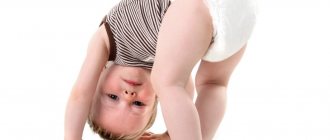Just as breastfeeding mothers wean their babies off the breast, bottle-feeding mothers are forced to wean their babies off bottles. The habit of sucking a pacifier and falling asleep with a bottle in the mouth is very developed among artificial babies. Nevertheless, it is simply necessary to wean a child off the bottle at a certain point, because the formula does not satisfy the growing baby’s need for nutrients, and in order to eat properly, it is very important for him to learn to eat “adult” food and drink from a cup. Getting a baby to part with a bottle is not an easy process, and during this process children become capricious and tearfully demand their favorite accessory, because sucking from a bottle not only satisfies hunger, but gives the child pleasure, calms and lulls.
Should you wean your baby off the bottle?
When babies are fed solids or are bottle-fed, they will undoubtedly become attached to the bottle. After all, for them it is equated to the breast and becomes an object for satisfying hunger and the sucking reflex. The bottle becomes an integral part of the baby’s life; it is warm, smells delicious and makes you feel full .
Imagine the fear and confusion that engulfs a child when he does not receive a favorite and vital item. Despite the fact that the bottle plays a particularly important role in the life of the baby, all psychologists and doctors unanimously assure that at a certain age the child must be weaned off it. This process is often combined with weaning the child off the pacifier.
If this is not done on time, then problems with health and speech may occur in the future.
Why is it important to wean your baby off the bottle?
Since there are several reasons to wean your child off the bottle at night and during the day, let’s look at the main ones:
- The most difficult problem is the formation of bite and the development of healthy teeth. If a baby stays with the bottle for a long time, the teeth begin to grow at an angle, which manifests itself as a cosmetic defect. An incorrect bite is formed, which in the future can lead to the development of caries. There have been cases when, with prolonged use, teeth developed normally. However, is it worth risking the health and beauty of your own baby?
- Specialists in the field of speech therapy believe that at 2 years old a child already needs to be weaned off the bottle, as problems may arise with the pronunciation of certain sounds;
- The sucking reflex should subside after a year. If the baby continues to suck his mother’s breast, pacifier, pacifier, toys, or his own fingers, then in the future this will lead to the formation of a pathological attitude;
- In addition, if the baby continues to have a sucking reflex, he begins to drink too much liquid. In this case, problems are associated with frequent night trips to the toilet, and they arise for parents, because after this it is difficult to put the child back to sleep.
In psychology
Psychologists say that a pacifier is for a baby like valerian for his parents. When they cannot cope with his whims, they take away his favorite toy - a bottle. She calms the child down. He loves to suck on everything: mom's breast, pacifier, and bottle. It is worth depriving him of the latter when anxiety and stress cannot cope with the child’s soul.
Usually he calms down by one and a half to two years of age. But, you say, this is at odds with physiology. Yes and no. Until this time, the child will not constantly be with the same bottle as at the age of three months.
Leave the bottle with nipple and milk overnight. This is even better than plugging his mouth with a pacifier. During the day, feed him what pediatricians recommend for this period of life.
When to wean your baby off the bottle
Experts in the field of medicine and psychology have not reached a clear opinion regarding the moment at which it is necessary to begin weaning, because each baby has its own developmental characteristics. In such cases, an individual approach is important. There is a theory that it is necessary to wean off gradually at the moment of growing up, which does not have a specific time frame and manifests itself in different ways. What will help parents correctly determine this period?
There are a number of signs that indicate goodbye to infancy:
- From the physiological side - the ability to sit, hold a spoon or cup firmly in your hands, which corresponds to the age of ten to twelve months. During this period, they usually begin to transfer the baby to drinking bowls, which represent an intermediate option;
- From the psychological point of view , a bottle or pacifier acts as a sedative. They stimulate the sucking reflex, which promotes relaxation, a feeling of safety and satiety. From this point of view, it is worth weaning when the sucking reflex subsides, which occurs by 1.5 - 2 years. It is at this age that new adaptation and anti-stress mechanisms begin to form, which greatly facilitates the process.
It is usually possible to wean a child off the bottle before he reaches 3 years of age. If your baby is naughty and doesn’t want to drink from a mug, you shouldn’t scold or punish him. Remember that there is a time for everything. Patience, love and care are the best helpers in the process of weaning a baby. Thanks to them, you can avoid nighttime hysterics and daytime whims.
Important information
In order to wean your child off his favorite bottle in a short time, you need to take into account the following rules:
- Children should not be allowed to use the attribute as a toy. Babies should associate the bottle only with eating. This will make it easier for parents to realize their idea.
- While feeding your baby, do not allow him to hold it on his own, then he will not get used to the inanimate object.
- Buy some fun games that require your participation. Try to devote as much time as possible to your children, engage them in various ways. For example, you can start sculpting figures together.
How to wean yourself off the bottle
There are several points that every parent should know:
- You cannot wean off abruptly at one moment, that is, you do not have to hide the bottle , and then say that it is lost, and under no circumstances return it to the child. After all, growing up occurs gradually, so you need to slowly get used to drinking from a cup. Let him say goodbye to his favorite object calmly and gradually;
- Parting with a bottle is a huge stress for a child . It is important that at this moment there are no other stress factors, such as a serious illness, moving, the appearance of a sister or brother, parental divorce;
- Gradually eliminate bottle feeding , first at lunchtime, then at breakfast and dinner. It is better if the baby starts drinking from a mug instead. Night supplementary feedings are excluded as a last resort;
- It often happens that children find it difficult to adapt to drinking from a cup ; they wet themselves, may choke, and because of this they cry and are capricious. As a transitional option, you can use a sippy cup. It is similar in shape to a bottle, but in its method of use it is similar to a mug. In addition, many drinking bowls have handles, and children learn to hold them like a cup;
- Buy your child's first dishes, but remember that they should not associate them with play . First of all, when the baby sees a plate and cup, he should think about food. Try to have your child regularly drink only from his own mug. Let his dishes always be in sight of the baby; they should arouse interest and attract attention so that the child wants to use them. Very often, parents use a trick: they pour a sweet, tasty drink into a mug, and a salty or neutral drink into a bottle. It would seem that this approach should give good results. However, the baby must outgrow this period himself and switch to “adult” dishes, this will help him develop correctly psychologically;
- If you notice that the child has become significantly colder towards the bottle , then at this stage you can say goodbye to it in a peculiar way. This ritual will help to finally recognize that the baby has grown up. Alternatively, give it to a doll, since she is still small and cannot do without it. In another case, we can say that the mother bunny asked her for her children. It is important that all this is on a positive note.
What not to do
Almost every child perceives separation from the bottle very painfully and begins to cry, be capricious, and show dissatisfaction with his entire appearance. In such cases, be firm and do not allow yourself to be led by the whims of your child. Children are very susceptible to changes in their parents' mood, so if you even think that you are in a hurry, the child will immediately feel it. Don't give up, because next time it will be much more difficult to wean him off.
Also, you should not separate your baby from his favorite things if he is already experiencing severe emotional turmoil: parents’ divorce, mother’s return from maternity leave, etc., otherwise an attempt at weaning risks ending disastrously for the baby’s psyche.
Correctly weaning your baby off the bottle at night
Since it is most difficult to wean a toddler off the bottle at night, parents need to be patient and cunning. Parents often delay this process because it’s hard to calm the baby down at night, and everyone needs sleep, so it’s easier to give him what he wants. However, such indulgence can have a negative impact on your baby's development.
What to do if you need to wean your child, but want to sleep? There are a few simple tricks:
- First, feed your little one well before bed. This will help him sleep more soundly, and even when he wakes up, he will not require food or drink;
- Secondly, bathe the baby before the evening feeding, this will relax the baby and he will be able to fall asleep quickly and soundly;
- Thirdly, if the baby wakes up in the middle of the night and demands a drink, then pour it into a cup or drinking bowl;
- Fourth, maintain optimal temperature and humidity in the room, so the baby will sleep comfortably and will wake up less often and ask for water.
Be understanding and patient with the whims of the night. Try to calm him down first: sing a lullaby, tell him a story, caress and rock the baby. The presence of parents and kind words will help the baby feel safe, and he will fall asleep, forgetting about his whims. Remember that care and love are the best helpers in this matter .
Psychologist's advice
Experienced psychologists advise learning to distinguish a baby’s manipulations from serious health problems. If you notice that your baby is constantly crying, refuses to eat, or sleeps poorly, consult a doctor immediately. In such a situation, it is better to postpone giving up the bottle until complete recovery. Also, do not forget that the crisis of 2 years in children often manifests itself with severe hysterics.
If you cannot calm the baby down, then try to find a compromise. Try to motivate your child by showing your imagination. Alternatively, offer to give the container to the mother cat so she can feed her kittens. This helps even in the most severe cases.
Remember that each child requires an individual approach. Don't scold or punish your baby, try to understand his behavior and let him grow up on his own.
Video
This video will help you get acquainted with the main points of weaning in more detail, tell you what problems parents may encounter, and how they can be solved. In addition, you will also learn how you can make bottle weaning as easy as possible.
Tell us how you survived this period? What worked for you and your baby? Or maybe you invented your own method? Share your experience in the comments, it may help other parents and their children.
Conducted research
Of course, in this case, as always with small children, sudden movements should be avoided. For example, you shouldn’t demonstratively throw away a bottle or say that mice ate it. This will be very stressful for the child. To understand the baby’s feelings, the mother should imagine what she would experience if something valuable and dear to her was taken away and thrown away without any reason. Of course, such an action will not please anyone, so the baby will cry for a long time, forcing the mother to return the bottle to its place.
You need to act gradually. First you need to try to give up the bottle during the day. If the child wants to drink, he should be offered a cup or sippy cup. To motivate your child, you should buy beautiful and bright children's dishes. If the baby likes the cup, he will drink from it with great pleasure.
You can also use a trick. For example, milk that will be poured into a bottle should be diluted with water (you can also add salt), and regular milk should be poured into a cup. Then let the child try drinking from a cup and from a bottle so that he can choose which milk tastes better.
A two-year-old child can also be taught by example. After all, mom and dad don’t drink liquid from a pacifier, but sit at the table and use dishes. It is worth explaining to the child that he is already old enough to eat and drink like other people.
It can be difficult to go on walks without a bottle. You will have to carry a sippy cup with you or take small packages of baby juice with a straw.
But it can be very difficult to wean a child from falling asleep with a bottle. For a baby, drinking milk from a bottle is part of the bedtime ritual. And if you exclude it, it will be difficult for the child to fall asleep. However, if the mother is determined, then the problem can be overcome. Although, you may have to go through three or four sleepless nights, calming a naughty baby.
You can try to switch the child's attention to another object. For example, give him a beautiful soft toy that he can hug in his crib while falling asleep.
If the child is already old enough, then it is worth talking to him and explaining that only babies drink milk from a bottle, and he is already old enough. Most kids want to grow up faster, so they will be flattered that their parents consider them big and independent.
Many children are compassionate, so they can be encouraged to “donate” their bottle to a younger child or, for example, a cat who finds it difficult to feed five kittens on her own.
Scientists have not left the problem of weaning from familiar things unattended. Several researchers from the university, which is located in the town of Temple (USA), observed 6,750 children for some time. Of these, 20% were bottle-fed artificial milk for up to two years. Scientists have concluded that these children are 30% more likely to become obese by the age of five.
Researchers also suggest that with age, the pacifier plays the role of a sedative and serves as a source of pleasure. Additional or main food does not benefit children, but is stored as fat. Among other things, bottle feeding interferes with getting proper nutrition. The child's diet should be varied.
Most pediatricians recommend that parents begin the weaning process at 12-14 months of age.











